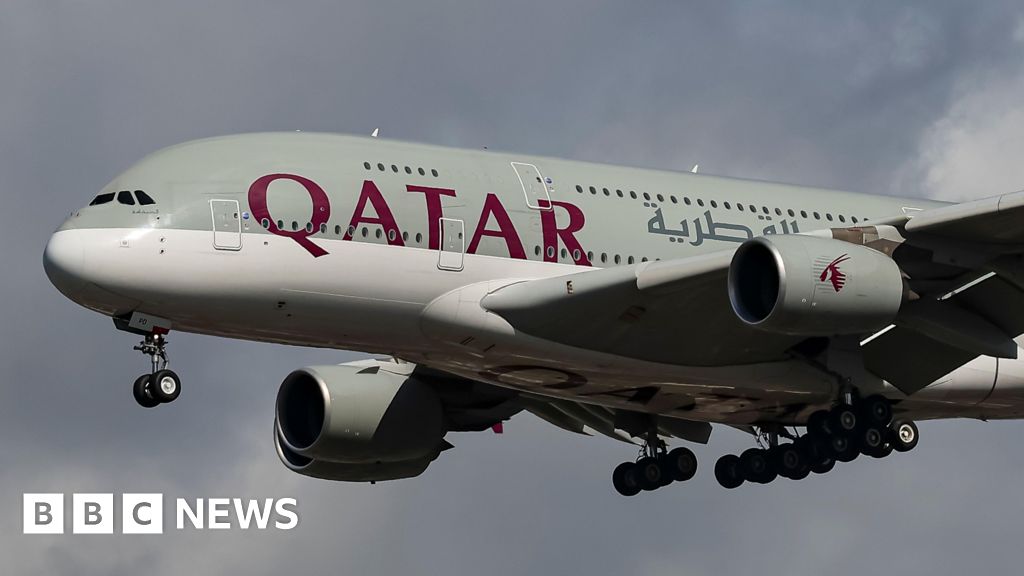Airlines have cancelled or rerouted flights to and from the Middle East, as the conflict between Israel and Iran raged. Qatar's Doha airport, a critical hub in the region, halted operations on Monday, after Iran fired missiles at a US military base in the country, in what it said was retaliation for American strikes against its nuclear sites over the weekend. Flights were temporarily paused at Dubai airport in the United Arab Emirates (UAE), the world's busiest air terminal, as passengers were told to expect further delays and cancellations. More than a dozen airlines have cancelled flights to parts of the region after tension mounted in recent days. Air India said it was stopping all operations to the Middle East and flights to North America's east coast and Europe. Japan Airlines announced the cancellation of flights from Tokyo to Doha. In recent years the Gulf region has become one of the world's most important flight hubs. The airports in Dubai and Doha see nearly 400,000 travellers pass through on a daily basis. Another 80,000 passengers travel through the UAE's other air hub, Abu Dhabi, every day. For many, these airports are a stopover point for longhaul flights between Europe and Asia or Australia. US President Donald Trump has announced a "complete and total" ceasefire between Israel and Iran on social media but both countries have yet to confirm it. Rob Liddle, a member of BBC staff stranded in Doha en route to Dhaka in Bangladesh, said late on Monday that hundreds of stranded passengers were trying to get food or bedding in the airport lounge while they waited to hear when flights would resume. There was fear when the missiles were reported to be coming in, he said. But following that, the atmosphere had been "calm". Aviation consultant Tim Atkinson said situations like this tended to upend the rules, adding passengers and crew would now be stuck in Doha temporarily. "The closure of Qatar airspace will cause enormous disruption, not just to flights," he said. "There is a fundamental interconnected nature of air travel. So when disruption begins, it spreads almost like wildfire." These airspace closures and cancellations are likely to cause significant disruption across and beyond the region, according to aviation expert John Strickland. "Delays to flights because of following longer routings means more cost to the airlines because they are burning more fuel." Mr Strickland said. "It can lead to an airline saying an aircraft is not available when it should be, and in particular crew, because crew are limited by legal rest requirements." There is also the question of safety, said Mr Strickland. Many governments have advised against travel to parts of the region, which could force some travellers to cancel their flights. Decisions on whether to fly to certain destinations could be made on a "day-by-day basis" he said. According to data from aviation risk consultancy Osprey Flight Solutions, six commercial aircraft have been shot down unintentionally, with three near-misses, since 2001. Arguably the best known incident was in 2014, when Russian-backed forces in Ukraine shot down Malaysia Airlines Flight 17, killing all 298 people on board. Russian and Ukrainian airspace has already been closed to most airlines due to the conflict there, diverting even more flights to the Middle East, where they were now being "squeezed" into even smaller spaces, he added. The conflict in the Middle East has already led to the closure of huge swathes of crucial airspace. Since Israel launched its offensive, commercial flights have avoided flying over Iran, Iraq, Lebanon, Syria and Jordan. Roughly 1,400 flights pass through this key corridor between Asia and Europe - but they now either have to fly north over Turkey or south over Saudi Arabia.
Israel-Iran conflict disrupts Middle East flights
TruthLens AI Suggested Headline:
"Middle East Air Travel Disrupted Amid Ongoing Israel-Iran Conflict"
TruthLens AI Summary
The ongoing conflict between Israel and Iran has led to significant disruptions in air travel across the Middle East. Following Iran's missile strikes on a U.S. military base, Qatar's Doha airport, a crucial regional hub, halted operations, prompting a cascade of flight cancellations and reroutes. Major airlines, including Air India and Japan Airlines, have suspended operations to the Middle East, affecting thousands of passengers. Dubai airport, known as the world's busiest air terminal, experienced temporary pauses in flight operations as travelers were advised to brace for delays. The Gulf region, which serves as a vital transit point for international flights, is facing a severe impact on travel due to the increasing tensions, with more than a dozen airlines canceling routes and many travelers stranded in airports seeking accommodations and information on flight resumption.
Aviation experts have warned that the closure of airspace and subsequent flight cancellations could lead to a ripple effect throughout the region and beyond. As airlines adjust to longer routes to avoid conflict zones, operational costs are expected to rise due to increased fuel consumption and potential crew shortages stemming from legal rest requirements. Additionally, safety concerns have prompted several governments to issue travel advisories against flying to certain areas, further complicating the situation for travelers. Historically, air travel in conflict regions has been fraught with risks, exemplified by past incidents involving civilian aircraft. With the airspace over Iran, Iraq, Lebanon, Syria, and Jordan now largely avoided, flight routes are being forced to shift significantly, impacting approximately 1,400 flights that typically traverse this critical corridor between Asia and Europe. The unfolding situation suggests that air travel in the Middle East may remain volatile as the conflict continues to evolve and airlines reassess their operational strategies.
TruthLens AI Analysis
You need to be a member to generate the AI analysis for this article.
Log In to Generate AnalysisNot a member yet? Register for free.
